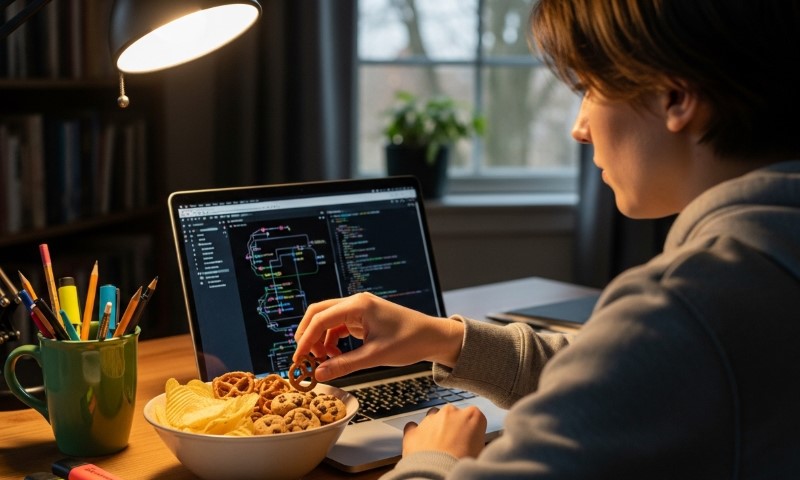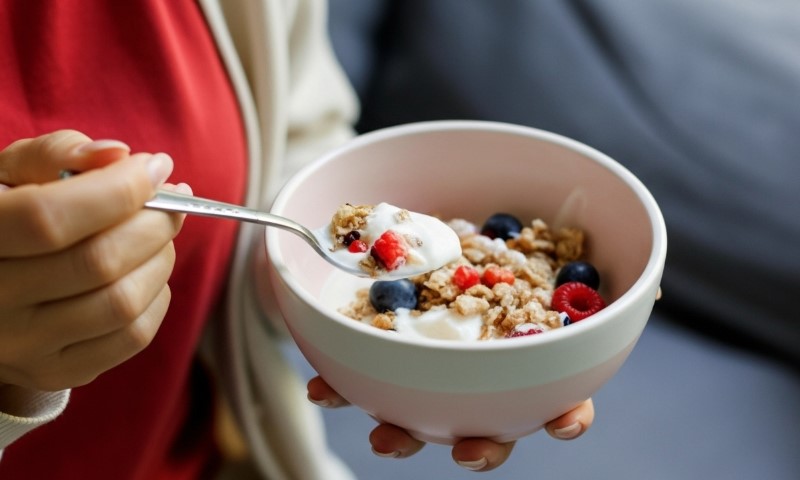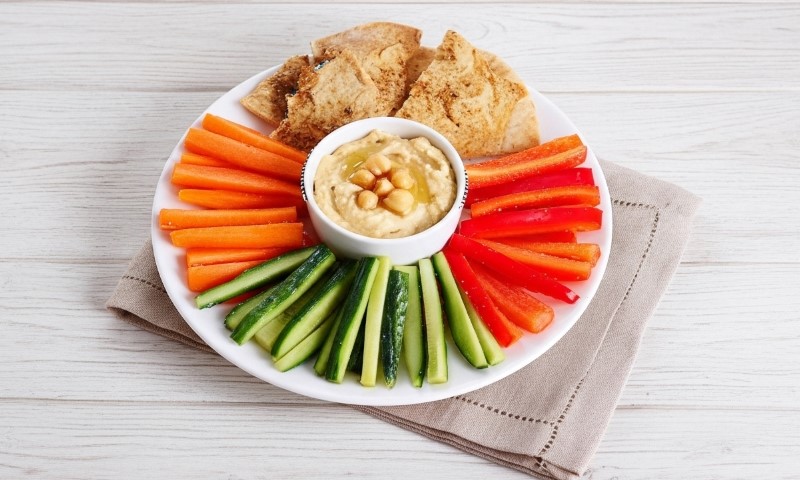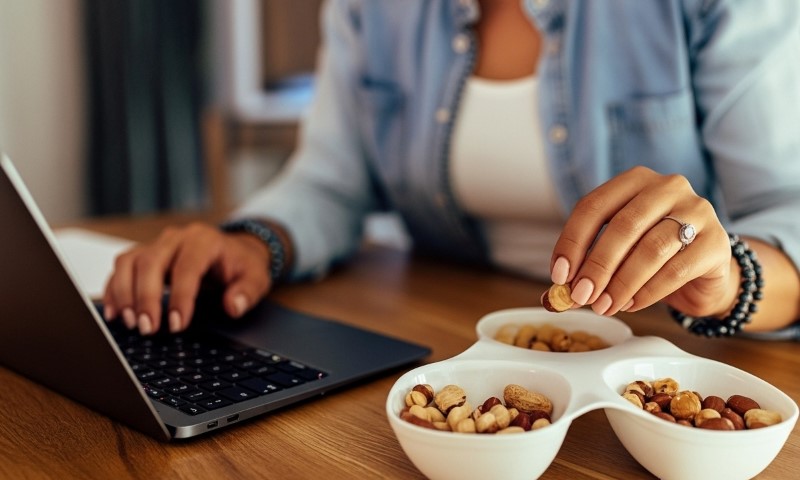
Healthy Study Snacks – Boost Focus Without the Crash
Studying pulls energy straight from your brain. It demands focus, stable energy, and hydration. But the typical study session often ends with sugar spikes, empty snack wrappers, and an energy crash that wipes out productivity.
A steady approach to snacking changes that picture. Food can become a quiet ally to your concentration instead of an unpredictable rollercoaster.
In this guide, we will show you how to fuel your mind without the crash or brain fog. You’ll get practical snack templates, caffeine guidelines, and easy swaps that work even in a dorm room. Let’s get started.
Key Points
- Balanced snacks with carbs, protein, fiber, and hydration keep focus steady and prevent crashes.
- Caffeine helps if timed early and kept moderate; green tea offers gentler focus.
- Added sugars are the main crash triggers; plain, whole, and low-GI foods work better.
- Rotation and timing of snacks every few hours sustain attention and mood.
How Food Supports Focus
Mental performance depends on how your body releases energy, not just how much you eat. Three principles matter most: slow carbohydrate release, steady protein intake, and proper hydration.
From there, you can add nutrients that support long-term brain health like polyphenols and omega-3s.
1. Stable Glucose Keeps You Steady
Your brain runs on glucose. As PubMed Central study shows , when blood sugar spikes and drops, your energy and focus drop too.
Low to moderate glycemic foods, like oats, fruit, and whole grains, release energy gradually. You stay alert longer without the sudden fatigue that follows refined carbs or sugary snacks.
2. Protein Supports Satiety
Protein doesn’t just build muscle. Controlled trials show protein-rich snacks such as yogurt or edamame increase satiety and improve appetite control for hours.
That’s useful when you’re deep into an essay or study block and don’t want to be thinking about your next meal.
3. Hydration Maintains Cognitive Performance
Even mild dehydration of 1 to 2 percent body mass can affect attention and working memory, studies show .
Keep a bottle near your desk and sip regularly. Water or unsweetened tea is enough; fancy drinks are unnecessary.
4. Caffeine is a Tool, Not a Meal
According to the European Food Safety Authority , up to 200 mg in a single serving is generally safe for healthy adults. But timing matters.
Late caffeine use disrupts sleep and can blunt memory consolidation. For long study sessions, use caffeine early in the day, then switch to decaf or herbal tea later.
Anatomy of a Focus-Friendly Snack

According to Harvard Health , a good study snack follows a simple formula: carbs + protein + fiber + fluids , with optional “upgrades” that deliver brain-supporting nutrients.
| Category | Examples | Purpose |
| Carbs | Intact grains, fruit, starchy vegetables | Steady energy |
| Protein | Greek yogurt, cottage cheese, tofu, edamame, eggs, hummus, nuts | Satiety, muscle repair |
| Fiber | Fruit skins, berries, oats, raw vegetables | Digestive and glucose balance |
| Fluids | Water, sparkling water, tea | Hydration |
| Upgrades | Berries, cocoa, walnuts, green tea | Polyphenols, omega-3s, L-theanine |
Snack Templates You Can Assemble in 2 Minutes

Quick snacks don’t have to mean empty calories. Each of the following combinations takes under two minutes to make and keeps energy steady through long study sessions.
Greek Yogurt Bowl
- 1 cup plain 2% Greek yogurt
- ½ cup berries
- 1 tablespoon chopped walnuts
- Sprinkle of cinnamon
Why it works: About 20 g of protein plus antioxidants from berries and plant fats from walnuts. The protein steadies appetite, and flavonoids in berries support cognitive function.
Whole-Grain Crackers with Hummus and Veg
- 6–8 whole-grain crackers
- ¼ cup hummus
- Sliced cucumber and bell pepper
Why it works: Complex carbs for slow energy, chickpea protein for steadiness, and fiber for balance. Follows the Dietary Guidelines for nutrient-dense snacking.
Peanut Butter Banana Roll-Up
- 1 small whole-wheat tortilla
- 1 tablespoon peanut butter
- 1 small banana
Why it works: Fiber and resistant starch slow the energy release from carbs. A portable, inexpensive option that fits tight schedules.
Cottage Cheese with Pineapple and Chia
- ¾ cup cottage cheese
- ½ cup pineapple chunks
- 1 teaspoon chia seeds
Why it works: Protein meets fiber. Chia adds omega-3s and texture, while pineapple provides quick carbs for energy.
Edamame Cup
- 1 cup steamed edamame, lightly salted
Why it works: Balanced plant protein, fiber, and electrolytes. Add lemon juice or chili flakes for flavor.
Hydration Checklist for Long Study Blocks
@studystream Replying to @lolosmsm Having to study for your upcoming exams after a long day of focusing in school can be really hard! Here are some top tips for keeping alert while studying: 🧃Stay Hydrated: Our brains are 73% water, and drinking enough of it is key to promoting focus and cognitive function. The added alertness boost that needing to go to the bathroom more frequently too will help you to keep focusing! 👯♀️ Body Doubling: This is the phenomenon where you’re more productive when working on tasks with others present. You can do this virtually in 24/7 focus rooms like StudyStream. This gives the added bonus of Hawthorne Theory, which theorises that you are more likely to perform better when you believe someone is watching you! You’re also way less likely to fall asleep with company! 😊 🍇 Light Snacks: Your body needs fuel to keep going! Eating something will stimulate your brain to focus more. Try to avoid heavy processed foods like crisps or cookies as these will cause you to crash! 💪 Physical Studying: Avoid passive studying tasks like readig notes or watching videos, as you are likely to fall into a rest state. Instead do something that gets your body moving! 🚿 (Bonus tip for caption readers👀) Shower: Going for a shower, preferably at a lower temperature than you normally would, will stimulate your senses and shock your system. Making you more alert, and ready to focus on your assignments! Going back to school after a long and restful summer can be difficult, we hope that these study tips and techniques will help you to focus down and ace all your exams! 📚✨ #studytok #academicvalidation #academictiktok #backtoschool #studytips #studytipsguru #students #studymotivation
Keep hydration automatic rather than reactive. Even mild dehydration can subtly degrade attention.
- Keep a 750 ml bottle nearby and refill every 1–2 hours.
- Add lemon slices, mint, or cucumber for taste without sugar.
- If you like sparkle, choose unsweetened sparkling water.
- Limit caffeine after mid-afternoon; it interferes with sleep and memory consolidation.
Caffeine, the Smart Way
Caffeine helps, but only within reason. Used well, it sharpens focus. Used poorly, it can cause anxiety and restless sleep.
Safe Dose
- Up to 200 mg in a single serving for most healthy adults.
- Many find 50–150 mg enough for alertness.
Best Timing
- Take caffeine early in the day.
- Avoid it within 6 hours of bedtime to preserve sleep quality.
Pairing with L-Theanine
Green tea naturally pairs caffeine with L-theanine, an amino acid that can improve reaction time and focus. If coffee feels too harsh, green tea or matcha offers a gentler lift.
Caffeine-Smart Options
- Morning: green tea or black coffee.
- Afternoon: switch to herbal tea or water.
- Avoid: energy drinks packed with sugar and stimulants.
Added Sugars Are the Hidden Crash Factor

Added sugars create quick highs followed by mental slumps.
- Limit: Under 10 percent of daily calories (about 50 g on a 2,000-calorie diet).
- Smart swap: Choose plain yogurt and add your own fruit.
- Label tip: Anything ending in “-ose” (like fructose or sucrose) usually adds up fast.
Brain-Supporting Ingredients Worth Including
Certain foods go beyond basic energy and actively support brain function. Here are ingredients worth adding to your regular snack lineup.
Berries and Cocoa Flavanols
Berries are packed with flavonoids that may enhance memory and learning. Cocoa flavanols have shown short-term performance benefits during demanding mental tasks. Add half a cup of berries or a teaspoon of cocoa to yogurt, oats, or smoothies.
Leafy Greens and Carotenoids
Spinach and kale contain lutein and other carotenoids linked with brain health. Slide greens into wraps or smoothies if salads aren’t practical.
Omega-3 Fats
Walnuts, chia seeds, and fish contain omega-3s that support long-term brain and heart health. Sprinkle nuts or seeds on yogurt or keep a small trail mix pack on hand.
Build Your Personal Snack Rotation

| Scenario | Snack Combo | Nutrients | Why It Helps |
| Early morning cram | Greek yogurt, berries, walnuts | ~20 g protein, fiber, polyphenols | Steady energy and full feeling through first hours |
| Between classes | Crackers, hummus, cherry tomatoes | Fiber, plant protein | Keeps blood sugar stable |
| Budget dorm option | Oats with milk, cocoa powder, banana | Fiber, protein, cocoa flavanols | Simple prep, steady release |
| Long afternoon block | Cottage cheese, apple slices, cinnamon | Protein, fiber | Prevents late-day hunger |
| Late-night light bite | Edamame with lemon, sparkling water | Protein, electrolytes | Hydration plus satiety |
| Pre-exam routine | Green tea, banana, peanut butter | Moderate caffeine, carbs, fat | Gentle lift without jitters |
Snack Swaps That Stop the Crash
| Instead of | Choose | Why It Works |
| Sweet granola bars | Nuts + seeds + dark chocolate chips | Lower sugar, higher fiber |
| Flavored yogurt cups | Plain Greek yogurt + berries + cinnamon | Controlled sugars, better protein |
| Energy drinks | Green tea or black coffee | Less sugar, steady caffeine |
| Chips | Homemade popcorn | Whole grain, lower fat |
Shelf-Stable Study Kit for Your Backpack
Keep a few reliable options on hand for long library sessions or travel days.
- Roasted chickpeas or edamame
- Whole-grain cracker packs
- Nut butter squeeze pouches
- Dried fruit (unsweetened, portioned)
- Dark chocolate squares
- Tea bags for hot water refills
Each fits within the pattern of nutrient-dense eating without exceeding sugar limits.
Timing Snacks to Match Attention Rhythms
Eat intentionally, not continuously. A small, balanced snack every 3 to 4 hours supports sustained attention better than random grazing.
- Morning: Mix carbs and protein to start metabolism.
- Afternoon: Choose lighter, hydrating foods.
- Evening: Keep snacks small and caffeine-free.
- Hydration rule: About 250–300 ml every 30–45 minutes.
Even minor dehydration can slow cognitive processing, so keep water within sight.
A 1-Week Snack Plan You Can Rotate
| Day | Morning | Afternoon | Evening |
| Monday | Greek yogurt + berries | Hummus + carrots | Popcorn + water |
| Tuesday | Oatmeal with cocoa + banana | Cottage cheese + apple | Edamame + cucumber |
| Wednesday | Peanut butter banana roll-up | Trail mix (30 g) | Veg sticks + tzatziki |
| Thursday | Smoothie with milk, berries, oats | Toast with ricotta + strawberries | Yogurt + chia |
| Friday | Green tea + oatmeal cup | Roasted chickpeas | Cheese cubes + apple |
Weekends are flexible, and you should maintain the same balance and hydration rhythm.
FAQs
The Simple Checklist
- Combine carbs, protein, and fiber.
- Keep added sugars below 10 percent of calories.
- Hydrate before thirst sets in.
- Limit caffeine to earlier hours.
- Use berries, greens, cocoa, and nuts for steady support.
A well-chosen snack isn’t a luxury during study time; it’s part of the plan. The right mix of carbs, protein, fiber, and hydration holds focus steady, helps you recall more, and prevents the burnout that follows a sugar spike.
With a few simple staples, such as yogurt, fruit, nuts, and tea, you can keep your mind sharp all semester.
References
- pmc.ncbi.nlm.nih.gov – The Influence of Glycemic Index on Cognitive Functioning: A Systematic Review of the Evidence
- pubmed.ncbi.nlm.nih.gov – Effects of high-protein vs. high-fat snacks on appetite control, satiety, and eating initiation in healthy women
- pmc.ncbi.nlm.nih.gov – The Hydration Equation: Update on Water Balance and Cognitive Performance
- efsa.europa.eu – Scientific Opinion on the safety of caffeine
- health.harvard.edu – Foods linked to better brainpower




